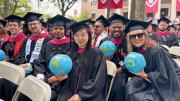Harvard Law School professor of practice Alan Jenkins ’85, J.D. ’89, first mentions his hometown (Great Neck, Long Island), but quickly moves on to his grandparents’. One pair moved to the United States from the Bahamas, the other from Georgia to Detroit during the Great Migration. “I’m kind of the product of those migrations in search of opportunity—economic opportunity and civil rights.” Entering the College, Jenkins knew he wanted to pursue “something social-justice oriented”—and continue filmmaking. In high school, he had shot movies and edited film by hand. His crowning achievement: a kung-fu feature he made with friends. (He still practices that martial art.) As an undergraduate he resurrected the Harvard Radcliffe Filmmaking Club and even considered a career in film before deciding on law. He spent a year at the ACLU before attending the Law School, where he edited The Civil Rights-Civil Liberties Law Review and met his wife, Kirsten Levingston, J.D. ’90. After a Supreme Court clerkship with Justice Harry Blackmun ’29, LL.B. ’32, LL.D. ’94, five years at the NAACP Legal Defense Fund, and a stint at the Justice Department, he and Levingston left Washington: “We often say we were the first people to move to New York City to slow down our lifestyle.” As director of human rights at the Ford Foundation, he led grant-making to groups focused on rights issues. Finding that many social-justice organizations struggled to share their ideas with the public, he left to co-found The Opportunity Agenda, a communications nonprofit. “My parents freaked out: ‘You’re leaving your job for what reason?’” He led the group for 13 years. Now, he’s back in Cambridge, teaching about race and the law, communication, and social justice. “For those who are trying to pursue a more fair and just society, I’m hoping to give them what took me 25 years to learn.”
Alan Jenkins

Alan Jenkins
Photograph by Jim Harrison
You might also like
Flocking Together
A former educator takes on one last big project: sheep farming
Faith through Film
The “Accidental Talmudist” on making Jewish movies
Understanding AI Vulnerabilities
As artificial intelligence capabilities evolve, so too will the tactics used to exploit them.
Most popular
Explore More From Current Issue
Lawrence Bacow on the Auschwitz Memorial
President Lawrence S. Bacow reflects on the liberation of Auschwitz
Why Taxi Drivers Don’t Die of Alzheimer’s
Explaining taxi and ambulance drivers’ protection against Alzheimer’s disease.








